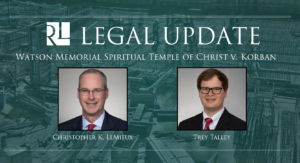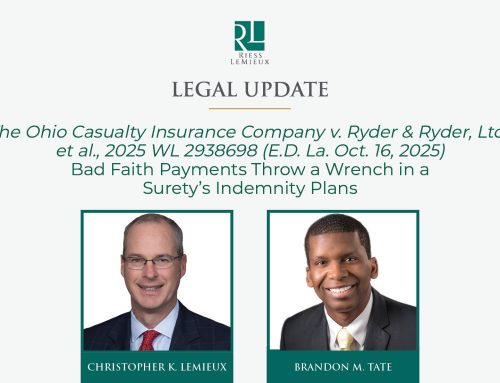 Watson Memorial Spiritual Temple of Christ v. Korban, 2024 WL 3218549, 2024-00055 (La. 6/28/24)
Watson Memorial Spiritual Temple of Christ v. Korban, 2024 WL 3218549, 2024-00055 (La. 6/28/24)
Authors: Christopher K. LeMieux and Trey Talley
The Louisiana Supreme Court holds that the payment of a money judgment based on inverse condemnation, or any statutory mandate, is a ministerial duty that may be enforced via mandamus.
In Watson Memorial Spiritual Temple of Christ v. Korban, the Plaintiffs were homeowners that prevailed in a state court action for inverse condemnation against the Sewerage and Water Board of New Orleans (“SWB”). The Plaintiffs received a money judgment in the amount of roughly $1.5 Million against the SWB. Thereafter, the SWB failed to appropriate funds to satisfy the judgment.
After attempting to file suit in federal court to enforce the judgment to no avail, the Plaintiffs filed a Petition for Writ of Mandamus in state district court, arguing that the SWB’s constitutional duty to pay just compensation for the taking or damaging of property is a ministerial duty required by law, and thus mandamus is proper. The SWB filed exceptions of no cause of action and res judicata, and the Louisiana Supreme Court granted certiorari.
The Court specifically analyzed the narrow issue of whether the payment of the judgment may be judicially compelled by mandamus, citing the relevant constitutional provisions and settled jurisprudence. The Court began by reaffirming that a mandamus is only proper to compel the performance of a duty that is ministerial in nature and not discretionary. Thus, “if a public officer is vested with any element of discretion, mandamus will not lie.” Citing the Louisiana Supreme Court’s prior case of Lowther v. Town of Bastrop, 20-1231, p. 5 (La. 5/13/21), 320 So.3d 369, 372, the Court reaffirmed that the relevant consideration is whether the act of appropriating funds to pay the judgment is a purely ministerial duty for which mandamus would be appropriate. Importantly, as in Lowther, the Court ultimately held that because the funds were appropriated by the legislature pursuant to a statutory and constitutional mandate, the duty to pay the Plaintiff was ministerial in nature and could thus be compelled via mandamus.
This holding is important for Public Works construction projects, as the public entity is statutorily required under the Louisiana Public Works Act to appropriate funds for the Public Works project. Thus, Lowther supports the fact that a mandamus action is appropriate to compel public entities to pay money judgments from Public Works projects, as well as other payments based on a statutory or constitutional mandate.



